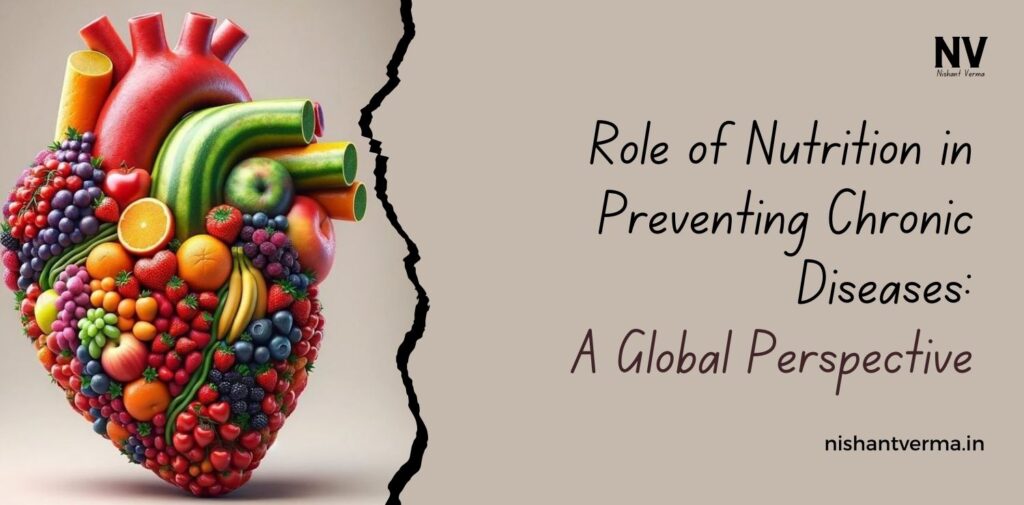In today’s fast-paced world, people often focus on the convenience of food rather than its health benefits. Yet, what we eat plays a vital role in determining our long-term health, especially when it comes to preventing chronic diseases like heart disease, diabetes, and obesity. These conditions have reached alarming levels globally and have become significant public health concerns. Thankfully, nutrition can be a powerful tool in preventing these diseases and promoting overall well-being.
The Growing Burden of Chronic Diseases
Chronic diseases are long-lasting conditions that can be controlled but not cured. They include illnesses such as heart disease, diabetes, hypertension (high blood pressure), and obesity. These diseases are responsible for millions of deaths worldwide each year and place a heavy burden on Healthcare systems.
What’s even more alarming is that many of these diseases are preventable with lifestyle changes, especially dietary improvements. Poor eating habits, high consumption of processed foods, lack of physical activity, and obesity are leading risk factors for these chronic conditions.

The Power of Nutrition
Nutrition refers to the intake of food, considering the body’s dietary needs. The link between diet and health is clear: what we eat influences the functioning of our bodies and determines our risk for various diseases. The nutrients in food—such as vitamins, minerals, proteins, fats, and carbohydrates—are crucial for maintaining the health of our organs, tissues, and cells.
Eating a balanced, nutrient-rich diet can significantly reduce the risk of developing chronic diseases. Conversely, an unhealthy diet high in unhealthy fats, sugars, and refined grains can increase the chances of diseases like heart disease, diabetes, and obesity.
Heart Disease: The Silent Killer
Heart disease, particularly coronary artery disease, is one of the leading causes of death worldwide. It occurs when the blood vessels supplying the heart with oxygen-rich blood become narrow or blocked, often due to the buildup of cholesterol and fatty deposits. A poor diet high in unhealthy fats and low in fiber can raise cholesterol levels and blood pressure, both of which are major risk factors for heart disease.
The role of nutrition in heart disease prevention:
- Healthy Fats: Instead of saturated fats found in animal products (like fatty meats, butter, and full-fat dairy), focus on unsaturated fats, which are found in olive oil, avocados, and nuts. These fats can help lower bad cholesterol levels.
- Fiber-rich foods: Whole grains, fruits, vegetables, and legumes are rich in fiber, which helps lower cholesterol and improve heart health.
- Antioxidants: Foods like berries, leafy greens, and nuts contain antioxidants that reduce inflammation and protect the heart from damage.

Diabetes: A Growing Concern
Diabetes, especially Type 2 diabetes, has become a global epidemic. It occurs when the body either cannot produce enough insulin (a hormone that regulates blood sugar) or cannot effectively use the insulin it produces. This leads to high blood sugar levels, which over time can damage the organs and increase the risk of heart disease, kidney failure, and nerve damage.
The role of nutrition in diabetes prevention:
- Low Glycemic Index (GI) foods: Foods with a low GI, such as whole grains, legumes, and non-starchy vegetables, release sugar into the bloodstream slowly, helping to maintain stable blood sugar levels.
- Healthy Fats and Protein: Incorporating healthy fats (like olive oil, nuts, and seeds) and lean proteins (like chicken, fish, and beans) can help maintain a stable blood sugar level.
- Portion Control: Eating smaller, balanced meals throughout the day, rather than large portions, helps prevent spikes in blood sugar.
Obesity: A Risk Factor for Many Diseases
Obesity is a significant risk factor for a wide range of chronic diseases, including heart disease, Type 2 diabetes, and certain types of cancer. It occurs when a person consumes more calories than they burn over a long period, leading to excess fat storage in the body. This extra fat puts additional stress on the body’s organs and systems, leading to complications.
The role of nutrition in preventing obesity:
- Calorie control: One of the most important ways to prevent obesity is by managing calorie intake. A balanced diet rich in whole foods like fruits, vegetables, whole grains, and lean proteins can help control calorie consumption while providing the nutrients needed for good health.
- Healthy Snacking: Opting for healthy snacks like fruits, nuts, or yogurt instead of sugary or processed snacks can help prevent overeating and maintain a healthy weight.
- Mindful Eating: Paying attention to hunger and fullness cues and avoiding overeating is key to preventing obesity. Slow, mindful eating helps regulate the body’s energy balance.
A Global Perspective: Diet and Lifestyle Around the World
Nutrition and the prevention of chronic diseases is a global issue. Across the world, there are stark differences in dietary habits, which directly affect health outcomes. While some countries suffer from undernutrition and the lack of essential nutrients, others face the challenges of overnutrition, where the consumption of unhealthy foods leads to obesity and related diseases.
In developed countries, processed foods, sugary drinks, and fast foods have become staples in many people’s diets. These foods are often high in unhealthy fats, sugars, and salt, which contribute to the rise in heart disease, diabetes, and obesity. On the other hand, in developing countries, the shift towards urbanization and Western diets is contributing to rising rates of non-communicable diseases (NCDs), even as infectious diseases remain a problem.
However, some countries are leading the way in promoting healthier diets. For example, the Mediterranean diet, rich in fruits, vegetables, whole grains, nuts, and healthy fats (particularly olive oil), has been shown to reduce the risk of heart disease and other chronic conditions. Similarly, many Asian countries with plant-based diets and minimal processed foods are seeing lower rates of obesity and diabetes.

Simple Dietary Tips for Preventing Chronic Diseases
While it might seem overwhelming to change dietary habits, small, gradual changes can make a big difference over time. Here are some simple dietary tips that can help prevent chronic diseases:
- Eat a variety of fruits and vegetables: Aim for at least 5 servings per day. They are rich in vitamins, minerals, and fiber that support overall health.
- Choose whole grains over refined grains: Whole grains like brown rice, oats, and whole wheat are more nutritious and help regulate blood sugar levels.
- Incorporate healthy fats: Olive oil, nuts, seeds, and fatty fish like salmon provide heart-healthy fats.
- Limit added sugars: Cut back on sugary drinks, candies, and processed foods. Opt for natural sweeteners like honey or fresh fruit when you need a sweet fix.
- Control portion sizes: Eating in moderation and controlling portion sizes can help prevent overeating and support weight management.
Conclusion: Role of Nutrition
Good nutrition is key to preventing chronic diseases like heart disease, diabetes, and obesity. By making conscious food choices, individuals can significantly reduce their risk of developing these conditions and improve their overall quality of life. Governments, healthcare systems, and individuals around the world need to prioritize nutrition and encourage healthy eating habits to tackle the global burden of chronic diseases. The power to prevent disease and improve health lies in the foods we choose to eat every day—small changes can make a world of difference!




